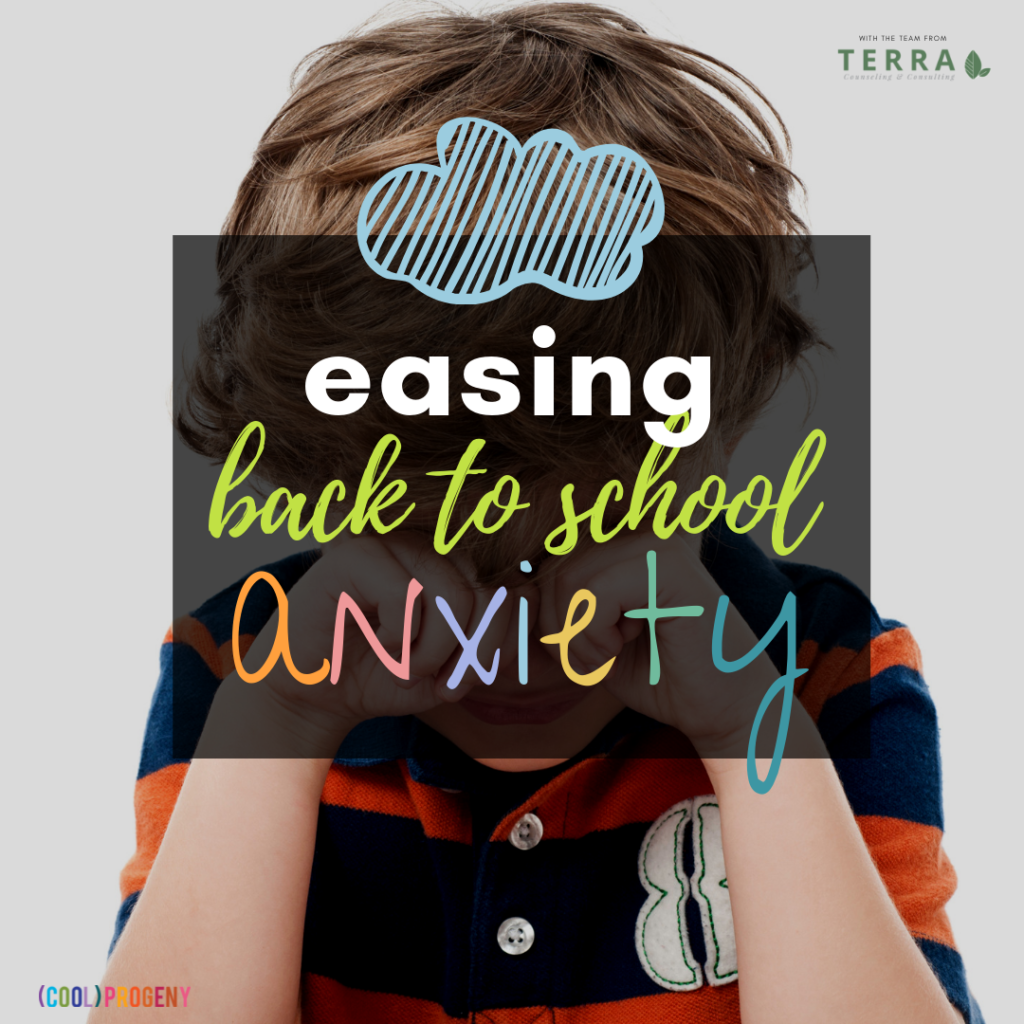
The back-to-school sales may have started weeks ago, but now it’s really creeping closer to the end of summer and the return to back-to-school routines. But never fear–even if you’re still subsiding on snowballs or closing down the neighborhood pool each night, it’s not too late to lay the groundwork for a smooth back-to-school transition.
We caught up with the experts at Terra Counseling and Consulting for some insight on guiding anxious students into a successful start to the school year. The Baltimore-based providers of clinical counseling, trauma therapy, and business coaching shared some of their top tips to reduce back-to-school anxiety.
HOW TO EASE BACK TO SCHOOL ANXIETY
WHAT ARE SOME OF THE SIGNS OF BACK-TO-SCHOOL ANXIETY IF YOUR CHILD DOESN’T COME RIGHT OUT AND SAY SOMETHING?
Some signs of hidden anxiety include irritability, a short fuse, and a tendency to become easily overwhelmed, fatigued, or withdrawn. But that’s not all–other signs may be somatic complaints like an upset stomach, headache, or complaints about neck or back pain.
One definite sign to look for? “They may also show avoidance traits including trying to stall or delay going to school or becoming excessively nervous or sad on Sunday nights leading into Monday mornings,” shares Amy Price, MA, LCPC, the Clinical Director at Terra, Counseling and Consulting.
WHAT ARE SOME PRACTICAL TIPS TO HELP REDUCE BACK-TO-SCHOOL STRESS?
Know When to Talk…and Keep Quiet
Price says that the first step is to normalize that transitions are hard. “Talk to your child about times when you’ve seen them successfully navigate transitions and times when they were unsure of something at first and then ended up liking it,” shares Price. Talking through these transitions ahead of time should give them confidence going into the new year. But when the big day actually comes? Price has a helpful suggestion on handling that, too. “When they get home, don’t ask questions right away. Give them snacks and let them unwind.”
Sneak-A-Peek
Take advantage of any possible “soft transitions” where they have the opportunity to visit their classroom, meet teachers, and identify all of the key spots, like where they will put their backpacks, eat lunch, enjoy recess, and go to the bathroom.
Establish Routines
Katie Kavalsky, MSW, LCSW-C, a Clinical Social Worker and Psychotherapist at Terra Counselling and Consulting, has some practical tips for creating routines. “One of the most common features about anxiety is it occupies our thoughts with future concerns,” she explains. “With big transitions, like starting the school year, it can be helpful to discuss elements of the future in ways that connect our worries to action steps or facts.”
One common worry might be getting ready in the morning and getting to school on time. “Rather than offering reassurances that “it will be fine,” it can help kids (and grownups!) to discuss a plan for addressing that worry,” says Kavalsky. In the days leading up to school, do some practice runs to ease anxious minds. Wake up on school time, pick out clothes the night before, create a checklist for everything you need to pack, and maybe even practice how long it takes to school. “A great way to redirect anxiety is through empowerment. The brain thrives on having a sense for how to be successful, so mapping out a plan that is achievable for addressing a worry is a great way to help everyone feel more prepared and excited,” says Kavalsky.

ANY SPECIAL TIPS FOR YOUNGER STUDENTS AND FIRST-TIMERS, LIKE INCOMING KINDERGARTENERS?
“Fresh beginnings can be extra challenging because the students do not have much experience to compare to,” says Kavalsky. To ease anxiety, focus on what your child knows already and cultivate curiosity about the unknown. For a child heading off to kindergarten, consider some aspects of the kindergarten experience that he or she can relate to, like playing with friends or eating lunch out of a lunch box. “If they can imagine familiar things occurring in unfamiliar circumstances, it can reduce a lot of anxiety about what they might face,” says Kavalsky. Then talk about the unknowns, using language like “I’m curious about…” or “I wonder…” (for example, “I wonder what games you might play at recess…or I’m curious about what books they have in the school library…”).
IS THERE AN IDEAL TIMELINE FOR HANDLING BACK-TO-SCHOOL ANXIETY?
Timing is important when it comes to tackling big changes. “Talking specifically about it too far in advance can actually increase the anticipatory anxiety,” explains Price. Space out the conversations so they aren’t happening all in one sitting, but a little over a time over a period of several days leading to the start of school.
ANYTHING YOU SHOULD AVOID DOING THAT MIGHT ACTUALLY CREATE MORE ANXIETY ABOUT THE RETURN TO SCHOOL?
Well-meaning parents always worry about tackling a problem the wrong way, and inadvertently making things worse. Price identifies tactics parents should avoid when dealing with school anxiety. It’s key to find a balance–both talking about constantly and avoiding the topic entirely are problems. Other tactics to avoid? “Talking about it as if they should be anxious about it. And dismissing their feelings and fears as invalid,” shares Price.
WHEN IS IT TIME TO SEEK SOME OUTSIDE HELP TO ADDRESS BACK-TO-SCHOOL ANXIETY?
Price says it’s time to seek outside help when your child is having panic attacks or terrified of the idea of school. Of course, any kind of self-harm or suicidal thoughts are serious red flags that need to be addressed immediately. “Once you’re a few weeks into school, if your child isn’t showing any improvement in adjusting to the school year, you may want to consult a therapist,” suggests Price.
ANY FINAL THOUGHTS?
‘To be honest, even after the best plans are made there may still be things the child is worried about,” says Kavalsky. What then? Encourage your kids to be brave! This will help navigate growing and changing and adapting to new experiences, like a new school year. Kavalsky has some inspiring thoughts on this, too. “We have to activate our Courage Superpower to help us move through the feelings of anxiety and uncertainty that come with the territory. It’s an amazing thing to get to the other side of something that felt so hard and overwhelming and realize the ways you grew stronger and more capable by taking on the challenge. Showing our kids that we love them, we are here for them, and we believe in them gives them so much courage to do the big and brave things they face every day.
Editor’s Note: This article was sponsored by Terra Counseling and Consulting on (COOL) PROGENY. Read the original article on their Blog and more about Terra in their Health and Wellness directory!
